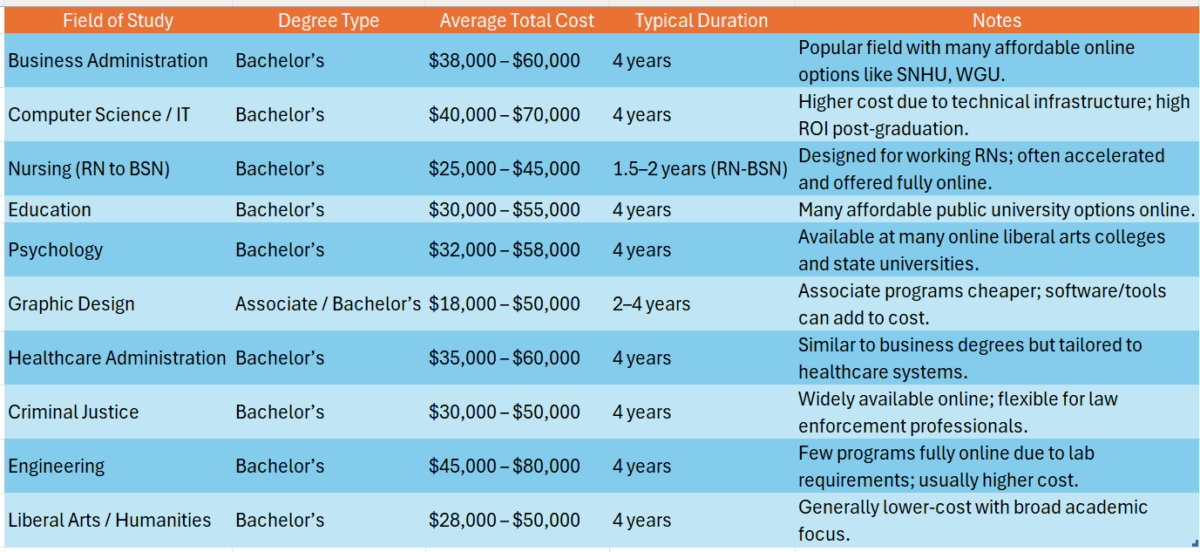
Understanding the Average cost of online college degree is essential for prospective students. As online learning becomes more popular, knowing the financial investment required can help you make informed decisions and better plan your finances.
What to Expect in 2024
In 2024, the average cost of online college degree programs varies significantly. For an Associate’s degree online college, students can expect to pay between $3,000 and $15,000 per year, depending on the institution and program specifics.
Average Online College Tuition for Master’s Degrees
For master’s degrees, the average online college tuition masters degree typically ranges from $10,000 to $30,000 annually. Many institutions offer financial aid options, making education more accessible to a broader audience.
Factors Influencing Costs
Several factors affect the average cost of online college degrees:
- Type of Degree: Associate’s degrees are usually less expensive than bachelor’s or master’s degrees.
- Institution Reputation: Prestigious universities may charge higher tuition fees.
- Location: Some states provide lower tuition rates for online students, especially residents.
Additional Costs to Consider
When budgeting, consider extra costs such as:
- Books and Materials: Often between $500 and $1,500 per year.
- Technology Fees: Charges for online platform access.
- Graduation Fees: Costs associated with graduation can vary by institution.
Conclusion
By understanding the average cost of online college degrees in 2024, you can better prepare financially and select a program that aligns with your budget and career aspirations. Always explore financial aid options to make education more affordable.
Start your journey to a brighter future—Enroll now!
What Factors Influence the Average Cost of Online College Degrees?
Understanding the average cost of online college degrees in 2024 is essential for students and families planning for higher education. With online learning becoming more popular, knowing what influences these costs can help you make informed decisions about your future. Let’s explore the key factors that determine these expenses.
Tuition Rates and Program Type
The type of program you choose significantly affects the average cost of an online college degree. For example, an Associate’s degree online college usually costs less than a Bachelor’s or Master’s degree. Public colleges tend to have lower tuition rates compared to private institutions, making them more affordable options.
Location and Residency
Your residency status also plays a crucial role. Many online colleges charge different rates for in-state and out-of-state students. If you reside in the same state as the college, you may benefit from lower tuition fees, which can impact the average online college tuition for a master’s degree.
Course Materials and Fees
Besides tuition, consider the costs of course materials and fees. Online programs may require textbooks, software, or other resources that can add to your overall expenses. Always verify if these costs are included in your tuition or if they are separate.
Financial Aid and Scholarships
Financial aid options can significantly influence the average cost of online college degrees. Many schools offer scholarships, grants, and loans to help students manage their expenses, making education more accessible.
Are Online Degrees Worth the Investment in 2024?
In 2024, the question of whether online degrees are worth the investment is more relevant than ever. With the rise of digital learning, many students are weighing the average cost of online college degrees against the potential benefits. Understanding these costs can help you make an informed decision about your education.
When considering an Associate’s degree online college, you might find that the average cost is often lower than traditional on-campus programs. Many community colleges offer affordable online options, making it easier to start your educational journey without breaking the bank.
Key Insights on Online Degree Costs:
- Average Cost: The average online college tuition for a master’s degree can range from $30,000 to $60,000, depending on the institution and program.
- Flexibility: Online degrees offer the flexibility to study at your own pace, which can save you time and money in the long run.
- Career Advancement: Many employers value online degrees, especially from accredited institutions, which can lead to better job opportunities and higher salaries.
In summary, while the average cost of online college degrees in 2024 might seem daunting, the potential for career growth and flexibility makes them a worthy investment for many students.
Comparing the Average Cost of Online College Degrees Across Different Fields

In 2024, understanding the average cost of online college degrees is crucial for students and families. With education shifting online, knowing what to expect financially can help in making informed decisions. Let’s dive into how costs vary across different fields and degree levels.
When looking at the average cost of online college degrees, it’s important to note that prices can differ significantly based on the degree type. For instance, an Associate’s degree online college typically costs less than a bachelor’s or master’s degree. On average, students might spend around $10,000 to $20,000 for an Associate’s degree, making it an affordable option for many.
Key Insights on Costs:
- Bachelor’s Degrees: Average online college tuition for a bachelor’s degree can range from $20,000 to $60,000. This varies by institution and program.
- Master’s Degrees: The average online college tuition for a master’s degree often falls between $30,000 and $50,000, depending on the field of study.
Understanding these costs helps students plan better and choose the right path for their future. Remember, investing in education is a step towards achieving your career goals!
Start your journey to a brighter future—Enroll now!
How to Budget for Your Online College Degree: Tips and Tricks
When considering an online college degree in 2024, understanding the average cost is essential for effective planning. Whether you’re pursuing an Associate’s degree online college or a master’s degree, budgeting wisely is crucial for achieving your educational goals.
Average Costs to Consider
The average cost of online college degrees varies significantly. For an Associate’s degree, expect to spend between $3,000 and $15,000 per year. Conversely, the average online college tuition for a master’s degree ranges from $10,000 to $30,000 annually. These figures can guide your savings and borrowing decisions.
Tips for Budgeting
- Research Schools: Seek institutions with competitive tuition rates.
- Financial Aid: Apply for scholarships and grants to ease costs.
- Plan for Extras: Don’t forget to budget for books and technology.
- Consider Part-Time Work: Balancing work and study can alleviate financial stress. By implementing these strategies, you can effectively manage the average cost of online college degrees and set yourself up for success!
Explore Flexible Payment Options
Many online colleges provide flexible payment plans, allowing you to spread costs over time and manage your budget more easily.
Keep an Eye on Hidden Fees
Be mindful of additional expenses like technology fees and course materials, as these can accumulate quickly. Factor them into your budget to avoid surprises.
Use Online Resources
Utilize free online resources like Coursera or edX to supplement your education without incurring extra costs.
Connect with Financial Advisors
Reach out to financial advisors at your school for personalized guidance on navigating educational expenses.
What Role Does Accreditation Play in the Average Cost of Online College Degrees?
When considering the average cost of online college degrees in 2024, one crucial factor to keep in mind is accreditation. Accreditation ensures that a college meets certain standards of quality, which can significantly impact tuition rates and the value of your degree. So, why does this matter?
The Importance of Accreditation
Accreditation can affect the average cost of online college degrees in several ways:
- Quality Assurance: Accredited programs often provide better education, which can lead to higher earning potential after graduation.
- Financial Aid Eligibility: Many financial aid options are only available for accredited programs, making them more affordable in the long run.
- Transfer Credits: If you plan to transfer to another institution, accredited degrees are more likely to be accepted, saving you time and money.
Cost Variations by Degree Type
For example, the average online college tuition for a master’s degree might be higher than that of an associate’s degree online college. This is because master’s programs often require more specialized courses and resources. Therefore, understanding the accreditation status of your chosen program can help you make informed decisions about your education investment. In summary, accreditation plays a vital role in determining the average cost of online college degrees, influencing everything from tuition rates to career opportunities.
How Degreesonline.education Can Help You Navigate the Costs of Online College Degrees
Understanding the average cost of online college degrees in 2024 is crucial for anyone considering further education. With rising tuition fees, knowing what to expect can help you make informed decisions. Whether you’re eyeing an associate’s degree online college or a master’s degree, being financially prepared is key.
At Degreesonline.education, we simplify the process of exploring online college costs. We provide detailed insights into the average online college tuition for a master’s degree, helping you budget effectively. Our resources break down tuition fees, making it easier to compare different programs.
Key Insights on Online College Costs
- Average Cost of Online College Degree: Tuition varies widely, but on average, expect to pay between $300 to $600 per credit hour.
- Associate’s Degree Online College: Typically, an associate’s degree can cost around $10,000 to $30,000 in total, depending on the institution.
- Master’s Degree Tuition: For a master’s degree, average online tuition can range from $15,000 to $40,000, depending on the program and school reputation.
By using Degreesonline.education, you can easily navigate these costs and find the best options that fit your budget and career goals.
Start your journey to a brighter future—Enroll now!
FAQs
1. What is the average cost of an online college degree?
The average cost of an online bachelor’s degree ranges from $30,000 to $60,000 in total, though it can vary widely based on the institution and program.
2. Are online degrees cheaper than on-campus degrees?
Yes, online degrees are often more affordable due to reduced campus fees, commuting costs, and housing expenses. However, tuition rates can be similar depending on the school.
3. Do in-state and out-of-state tuition rates apply to online degrees?
Many public colleges offer the same tuition rate for online students regardless of residency, but some still charge higher rates for out-of-state students.
4. What factors affect the cost of an online degree?
Key factors include the type of degree (associate, bachelor’s, master’s), school (public vs. private), length of the program, and any additional fees for technology or materials.
5. Are there hidden fees in online degree programs?
Yes, some programs may charge additional fees for technology, proctoring services, course materials, or online platform access.
6. Can I get financial aid for an online college degree?
Yes, accredited online degree programs are eligible for federal financial aid, scholarships, grants, and even employer tuition assistance.




